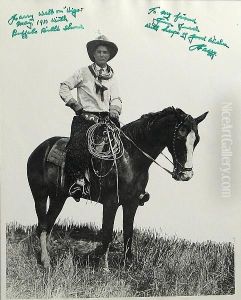William F. Cody Paintings
William Frederick Cody, better known as Buffalo Bill, was born on February 26, 1846, in Le Claire, Iowa Territory. Though not an artist in the traditional sense of painters or sculptors, Cody's life was itself a canvas that portrayed the vivid and tumultuous history of the American West during the 19th century. His contributions to American culture were through his performances and showmanship, which immortalized the image of the West in the minds of audiences both in the United States and abroad.
Buffalo Bill's early life was marked by the hardships of frontier life. His father died when he was just 11, forcing Cody to take up work at a young age to support his family. He worked as a rider for the Pony Express at the age of 14, served as a civilian scout for the US Army during the Indian Wars, and earned his nickname 'Buffalo Bill' for his skill in supplying Kansas Pacific Railroad workers with buffalo meat.
Cody's transition to a life of performance began in 1869 when he met writer Ned Buntline, who later published a series of dime novels that embellished Cody’s exploits. This propelled him to national fame, leading to the creation of 'Buffalo Bill's Wild West' show in 1883. This traveling show was a pioneering form of entertainment that combined elements of a circus, a rodeo, and a theatrical play, featuring real cowboys and Native Americans, dramatic reenactments of famous battles, and displays of marksmanship, riding, and roping.
The Wild West show was instrumental in shaping the global perception of the American West, with Cody himself as its most iconic figure. He was known for his flamboyant personality, exceptional skills, and a strong sense of justice that resonated with audiences worldwide. The show toured the United States and Europe, making Cody one of the most recognized Americans of his time.
Despite the controversies surrounding his portrayal of Native Americans and the romanticized version of the West, Cody was an advocate for Native American rights and a respected figure among many Native communities. He employed a number of Native Americans in his show, including the famous Lakota leader Sitting Bull, and argued for their right to vote and recognition of their land claims.
William F. Cody died on January 10, 1917, in Denver, Colorado. His legacy is a complex tapestry of American history, embodying the spirit of the frontier and the transformation of the American West into a cultural mythos that continues to fascinate and influence. Cody's life and the Wild West show left an indelible mark on American entertainment, history, and identity.
